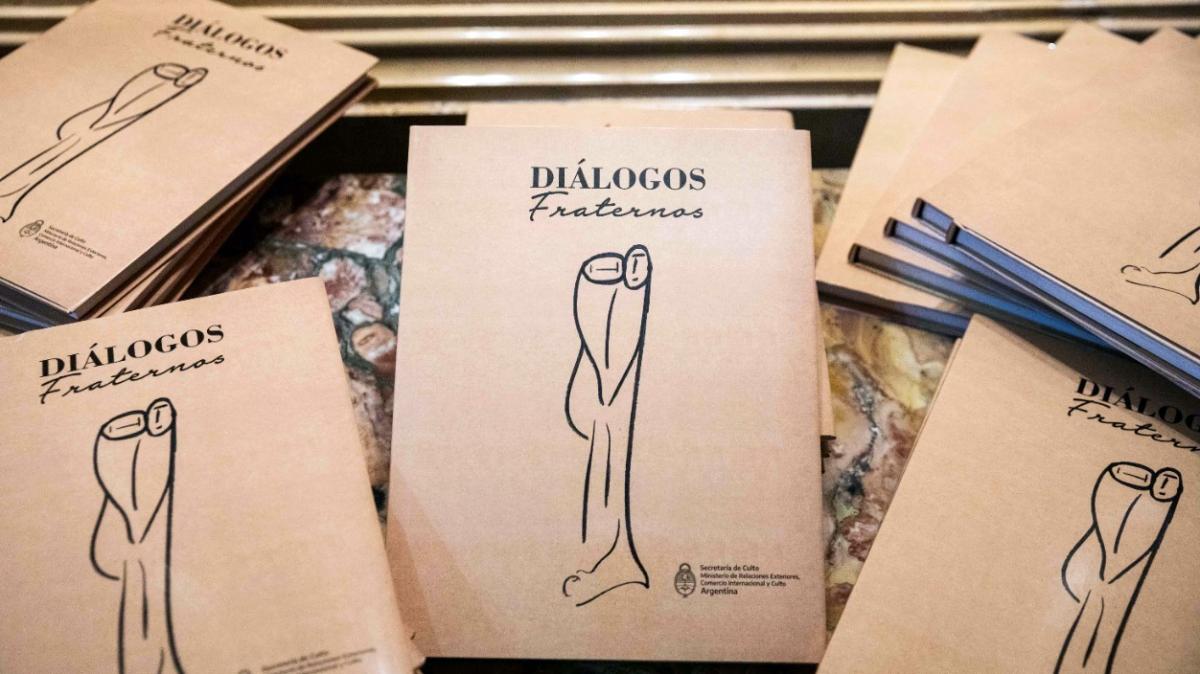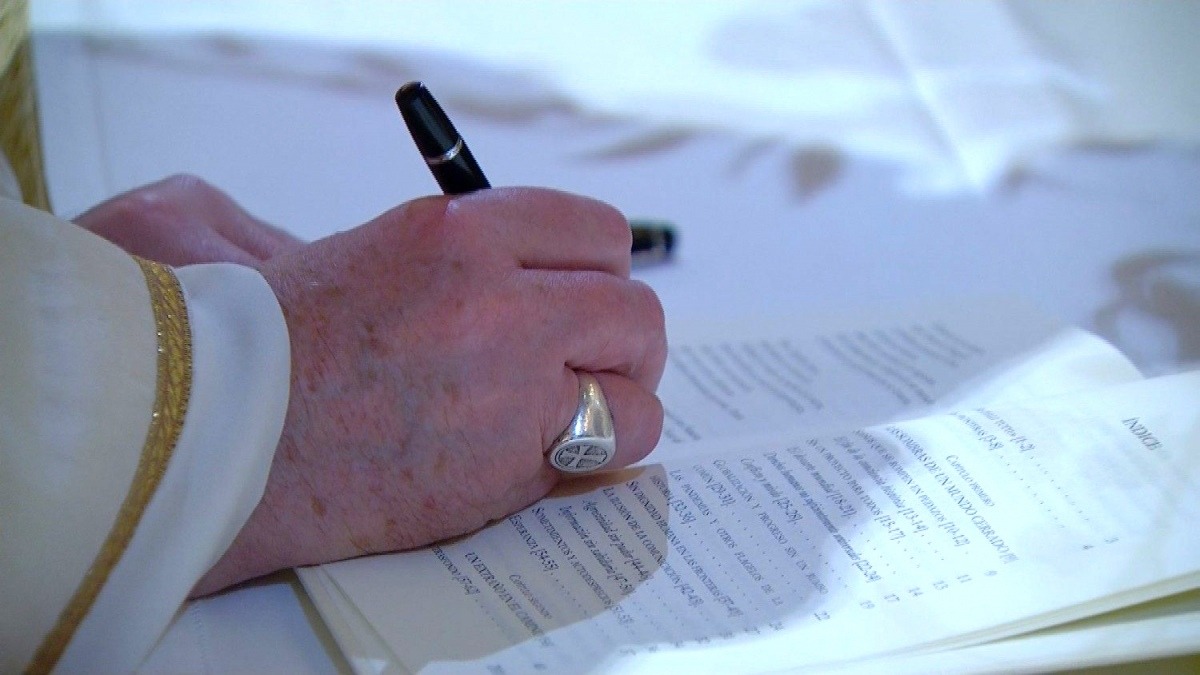All brothers. This is how Fratelli Tutti translates. The last encyclical letter of Pope Francis.
To accompany and strengthen this text of the Holy Father loaded with lapidary political definitions, the book was born: “Fraternity Dialogues”. It was in mid-July that the 500 printed copies were presented by the publishing house of the University of Buenos Aires (EUDEBA), with illustrations by the artist Alejandro Marmo (who ceded his copyright), and from now on anyone with internet access you can read by entering here.
The book “Fraternity Dialogues” was an initiative of the secretary of Cults of the national government that managed to collect the wisdom of 16 personalities from different countries and various disciplines on human fraternity after the experience of the global coronavirus pandemic.
Guillermo Oliveri directs Cults for the fourth term (he began with Néstor Kirchner, followed by the two terms of Cristina Fernández), that is, almost 20 years of experience. This seasoned Peronist in faith, born in the Buenos Aires town of Baradero, summoned his team with the aim of publicly accompanying the preaching and actions of the first Vicar of Christ of Argentine nationality.
It was a global impact as Bergoglio surfed the coronavirus pandemic. In full global uncertainty of a highly contagious and deadly disease, the Pope was encouraged to cross the Vatican walls. That moment, on Sunday, March 15, 2020, he was immortalized with a photo: the man in white walking down the empty Vía del Corso and a few meters away a young man passing by on a bicycle. Jorge Mario was on a pilgrimage to pray in two legendary churches for having saved Rome from the great plague of the 16th century.
The other moment of global impact that placed the Pope in world leadership, to this day the highest level of visibility in the modern era, was the extraordinary prayer for the end of the coronavirus, on a rainy Friday, March 27, 2020. That image is in “Fraternity Dialogues” when one passes the cover of the book.
On the cover flap is Oliveri’s column of reflection where he calls for a rediscovery of the globalization of good that Francis heads and is supported by the 16 personalities of culture, social and other religions who “seek global peace and social justice” .
It was María Eugenia de Cruz who put the proposal on the table. The national director of Worship affairs and team had a year of work to get all the papers. The one that cost the most was Ayram Noam Chomsky, the prestigious American linguist of Jewish origin.

The prologue is signed by the Holy Father. At the bottom of the page the unmistakable small letter of his fist and in black ink the figure “Francisco”. The watermark, to certify its veracity, of the personal secretary of the Pontiff. “Called to walk together” says Bergoglio opening the door to the experience of these servants of social friendship.
The first testimony is the imam of Muslims in Argentina, Abdelnaby Elhefnawy. “Build bridges of communication for a sincere dialogue” wrote the sheikh of the Argentine Islamic Center who cites the Koran and the prophet of Islam Muhammad committed to protecting Christians and Jews.
“Put love into action.” Thus begins his writing by the Argentine Nobel Peace Prize winner and artist, Adolfo Pérez Esquivel. Who leaves us a little memory: “A street singer on the train with his accordion called the passengers saying: ‘only love will save the world'”. This popular singer told Pérez Esquivel that “in the heart of the humble is the strength to put love into action” and concludes that spirituality united with prayer “puts love into action, that is the strength of faith that moves mountains”.
While Chomsky focused his reflection with the title “towards a better policy” where he links Francis with the highest ideals of the Enlightenment and points to the neoliberal doctrine with 40 years of attacking civilization and the common home.
The first woman in the book is Azza Karam. She is an Egyptian intellectual and chair of the United Nations Intergovernmental Task Force on Religion. She recalls that Fratelli Tutti is a “spiritual manual” that unifies the human family. Karam acknowledges that in the Islamic citations of the Pope in her encyclical she immediately sparked a connection with her.”
The book “Fraternal Dialogues” in virtual format gained momentum on social networks by “Factor Francisco”, a group of lay people with a long history in the Argentine church from the “Centro Nueva Tierra”. Headed by Néstor Borri and Santiago Barassi, “Francisco Factor” has been amplifying the preaching and actions of the Pope in Peronism, uniting the art-pop aesthetics of Andy Warhol with our popular and religious culture. Borri and Barassi are so committed to mysticism and politics through Francis that they have published 10,000 copies of “Fratelli Tutti” that they give away for free.
For his part, the Lebanese Cardinal, Béchara Boutros Rai, of the Maronite Catholic Church, acknowledges that he has spoken of “Fratelli Tutti” on several television channels and details the Lebanese experience “towards an increasingly larger us” that was considered as example of human brotherhood for the world by Pope Saint John Paul II in his apostolic exhortation: “a new hope for Lebanon”.
Another Argentinian, Fortunato Mallimaci, a religious researcher, expresses that the encyclicals Laudato Si and Fratelli Tutti summarize Francis’s global proposal, highlighting “something new: popular movements, as actors and builders of a new society from the peripheries.”
The Italian Giovanni Traettino is known because for the first time a Pope left the Vatican for a private meeting with an evangelist pastor. That concrete brotherhood between Bergoglio and Traettino is one of the attractions of the book “Fraternity Dialogues” where the pastor acknowledges that “Fratelli Tutti” is an encyclical that caused “reservations” in some Christian circles.
The British expert on religion and politics, Jocelyne Cesari, believes that religions are in a new leadership for having an agenda in the improvement of the human race that goes beyond the limits of closed nationalists, as it happens in India with the anti-Muslim Hindus. .
Latifa Ibn Ziaten, born and raised in Morocco and a French citizen by adoption, gives the most moving testimony in “Fraternity Dialogues”. Her son Imad was killed by a young fanatic. She takes revenge by transmitting spiritual values among excluded youth. Latifa’s struggle was honored by the Grand Imam, Ahmed Al-Tayeb, and by Pope Francis. On February 4, 2021, she received the award and the United Nations voted that date to be the day of human fraternity, in tribute to the document signed by both religious in Abu Dhabi on world peace and common coexistence.
Also, the Brazilian environmentalist theologian, Leonardo Boff, contributed his own. For him, conquest and competition, “a general tendency of all men, who guarantee their power by seeking even more power”, according to psychoanalyst Carl G. Jung, has the encyclicals Laudato Si and Fratelli Tutti as a saving solution. “The dream of the two Francis, that of Assisi and that of Rome, did not die.”
Liberian and Nobel Peace Prize winner in 2011, Leymah Roberta Gbowee, sees that the cruel reality of the third war in quotas such as the buying and selling of people, comes out with the vision that Martin Luther King, Nelson Mandela and Mahatma Gandhi had and which Francis updates today with the document he signed together with the Great Imam, Ahmed Al-Tayeb.
María Noel Vaez, head of UN Women, focused on her role. While the Spaniard, Miguel Ángel Moratinos Cuyaubé, representative of the United Nations for the Alliance of Civilizations, highlighted the action plan to safeguard places of worship and the elaboration of a cartography of these sites, which in the case of America highlights the authorities Argentines.
The last two texts remained in the hands of religious.
Óscar Ojea, theologian and head of the Argentine Episcopal Conference (CEA), ponders the three sources of Fratelli Tutti, and in his development of the culture of listening he believes that introspection is central: “listening to our body and our heart, we will only be able to listen to others”.
While the Sephardic Chief Rabbi of Israel, Yitzhak Yosef, affirmed that “Pope Francis’s initiative in his service to spread peace in the world” is “very important.” In addition, the rabbi shows his concern with “excessive consumption” and believes that international cooperation is essential “to put an end to the drama of economic inequality.”
The book’s closing is a double-page photo of Pope Francis praying in Iraq at the foot of a building collapsed by war.
“Fraternity Dialogues” is in Spanish and English, and all the authors have received it as the Argentine ambassadors of their countries.
Secretary of Worship Oliveri made the presentation of “Fraternity Dialogues” at the Colegio Pio Latinoamericano of the Society of Jesus, in Rome, on September 6. There he was accompanied by Imam Marwan Sarwar Gil, the rabbi and director of Radio Jai, Miguel Steuermann, both in Argentina architects of the Jewish-Muslim brotherhood, along with another rabbi, Saúl Bonino, the Argentine ambassador to the Holy See, María Fernanda Silva , and the rector of the headquarters, the Jesuit priest, Gilberto Freire.
Of course, the Pope received his paper copy. Oliveri took him to his community residence, Santa Marta.

